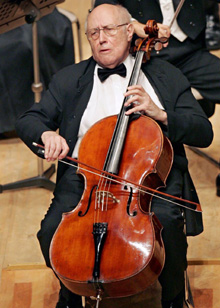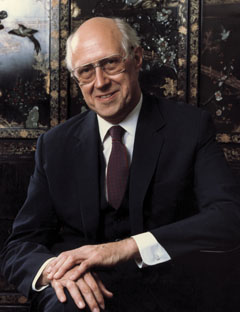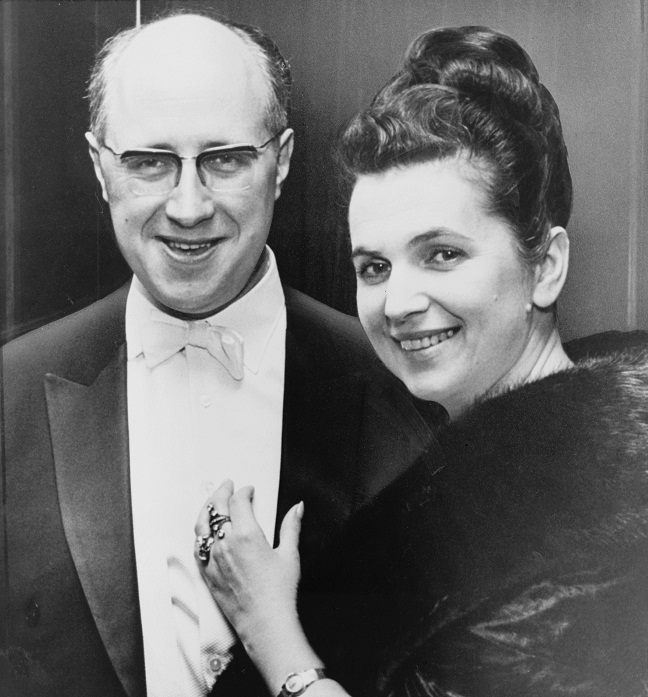<Back to Index>
- Veterinary Surgeon Claude Bourgelat, 1712
- Cellist and Conductor Mstislav Leopoldovich Rostropovich, 1927
- King of France and of Navarre Louis XVII, 1785
PAGE SPONSOR
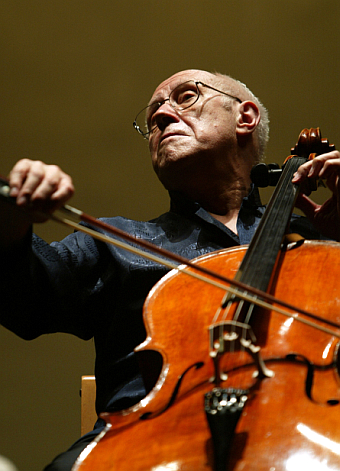
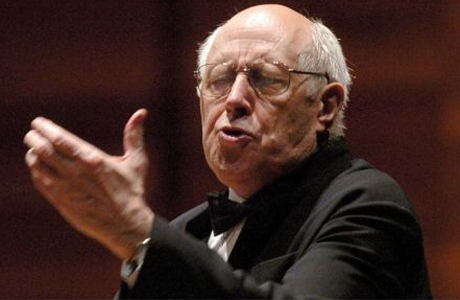
Mstislav Leopoldovich Rostropovich, KBE (Russian: Мстисла́в Леопо́льдович Ростропо́вич; March 27, 1927 – April 27, 2007), known to close friends as “Slava,” was a Soviet and Russian cellist and conductor. He was married to the soprano Galina Vishnevskaya. He is widely considered to have been the greatest cellist of the 20th century, and is considered by some of his peers to have been the greatest cellist of all time. In addition to his outstanding interpretations and technique, he was well known for his commissions of new works which enlarged the cello repertoire more than any cellist before or since. He gave the premieres of over 100 pieces.
He
was internationally recognised as a staunch advocate of human rights,
being awarded in 1974 the Annual Award of the International League of
Human Rights. Rostropovich was born in Baku, Azerbaijan SSR, USSR, to ethnic Russian parents who moved there from Orenburg. His father, Leopold Vitoldovich Rostropovich, was also partly of Belarusian - Polish noble descent. That part of his family bore the Bogorya coat of arms, which was located at the family palace in Skotniki, Masovian Voivodeship. He grew up in Baku and spent his youth there. During World War II his family moved back to Orenburg and then in 1943 to Moscow. At the age of four Rostropovich learned the piano with
his mother, Sofiya Nikolaevna Fedotova, a talented pianist. He started
the cello at the age of 10 with his father, who was also a renowned
cellist and former student of Pablo Casals. In 1943, at the age of 16, he entered the Moscow Conservatory. He studied not only the cello and piano, but also conducting and composition, until 1948. Among his teachers were Dmitri Shostakovich and Sergei Prokofiev.
In 1945 he came to prominence as a cellist when he won the gold medal
in the first ever Soviet Union competition for young musicians. He became professor of cello at the Moscow Conservatory in 1956. Rostropovich gave his first cello concert in 1942. He won first prize at the international Music Awards of Prague and Budapest in
1947, 1949, and 1950. In 1950, at the age of 23 he was awarded what was
then considered the highest distinction in the Soviet Union, the Stalin Prize. At that time, Rostropovich was already well known in his country and while actively pursuing his solo career, he taught at the Leningrad (Saint Petersburg) Conservatory and the Moscow Conservatory. In 1955, he married Galina Vishnevskaya, soprano at the Bolshoi Theatre. Rostropovich had working relationships with Soviet composers of the era. In 1949 Sergei Prokofiev wrote his Cello Sonata in C, Op. 119, for the 22 year old Rostropovich, who gave the first performance in 1950, with Sviatoslav Richter. Prokofiev also dedicated his Sinfonia Concertante for cello to him; this was premiered in 1952. Rostropovich and Dmitry Kabalevsky completed Prokofiev's Cello Concertino after the composer's death. Dmitri Shostakovich wrote both his first and second cello concertos for Rostropovich, who also gave their first performances. His international career started in 1963 in the Conservatoire of Liège (with Kirill Kondrashin) and in 1964 in West Germany. Rostropovich went on several tours in Western Europe and met several composers, including Benjamin Britten. Britten dedicated his Cello Sonata, three Solo Suites, and his Cello Symphony to Rostropovich, who gave their first performances. In 1967, he conducted Tchaikovsky's opera Eugene Onegin at the Bolshoi, thus letting forth his passion for both the role of conductor and the opera.
Rostropovich played at The Proms on
the night of August 21, 1968. He played with the Soviet State Symphony
Orchestra and it was the orchestra's debut performance at the Proms.
The programme featured Czech composer Antonín Dvořák's Cello Concerto and was the same day that Russians invaded Czechoslovakia to put an end to Alexander Dubček's Prague Spring. It was reported that he was crying as he performed. Rostropovich fought for art without borders, freedom of speech, and democratic values, resulting in harassment from the Soviet regime. An early example was in 1948, when he was a student at the Moscow Conservatory. In response to the 10 February 1948 decree on so-called 'formalist' composers, his teacher Dmitri Shostakovich was
dismissed from his professorships in Leningrad and Moscow; the then
21 year old Rostropovich quit the conservatory, dropping out in
protest. In 1970, Rostropovich sheltered Aleksandr Solzhenitsyn,
who otherwise would have had nowhere to go, in his own home. His
friendship with Solzhenitsyn and his support for dissidents led to
official disgrace in the early 1970s. As a result, Rostropovich was
restricted from foreign touring, as was his wife, soprano Galina
Vishnevskaya, and he was sent on a recital tour of small towns in Siberia. Rostropovich left the Soviet Union in 1974 with his wife and children and settled in the United States.
He was banned from several musical ensembles in his homeland, and his
Soviet citizenship was revoked in 1978 because of his public opposition
to the Soviet Union's restriction of cultural freedom. He returned to
Russia in 1990.
From 1977 until 1994, he was musical director and conductor of the U.S. National Symphony Orchestra in Washington, while still performing with some of the most famous musicians such as Martha Argerich, Sviatoslav Richter and Vladimir Horowitz. He was also the director and founder of the Rostropovich Music Festival and was a regular performer at the Aldeburgh Festival in the UK. His impromptu performance during the fall of the Berlin Wall as events unfolded earned him international fame and was reported throughout the world. His Russian citizenship was restored in 1990, although he and his family had already become American citizens. In modern Russia, Rostropovich was welcomed by high officials. He supported Boris Yeltsin during the 1993 constitutional crisis (Rostropovich conducted the National Symphony Orchestra in Red Square at the height of the crackdown), and was also on friendly terms with Vladimir Putin. Rostropovich received many international awards, including the French Legion of Honor and
honorary doctorates from many international universities. He was an
activist, fighting for freedom of expression in art and politics. An
ambassador for the UNESCO, he supported many educational and cultural projects. Rostropovich performed several times in Madrid and was a close friend of Queen Sofía of Spain. Rostropovich and his wife, Galina Vishnevskaya founded the Rostropovich - Vishnevskaya Foundation,
a publicly supported non-profit 501(c)(3) organization based in
Washington, D.C., in 1991 to improve the health and future of children
in the former Soviet Union. The Rostropovich Home Museum opened on March 4, 2002, in Baku. Rostropovich and Vishnevskaya visited Azerbaijan occasionally. Rostropovich also presented cello master classes at the Azerbaijan State Conservatory. Together they formed a valuable art collection. In September 2007, when it was slated to be sold at auction by Sotheby's in London and dispersed, Russian billionaire Alisher Usmanov stepped
forward and negotiated the purchase of all 450 lots, in order to keep
the collection together and bring it to Russia as a memorial to the
great cellist's memory. Christie's reported that the buyer paid a
"substantially higher" sum than the £20 million pre-sale estimate. In 2006, he was featured in Alexander Sokurov's documentary Elegy of a life: Rostropovich, Vishnevskaya. His instruments included the 1711 Duport Stradivarius, a Storioni on which he made most of his recordings and a Peter Guarneri of Venice. Rostropovich's health declined in 2006, with the Chicago Tribune reporting
rumors of unspecified surgery in Geneva and later treatment for what
was reported as an aggravated ulcer. Russian President Vladimir Putin visited
Rostropovich to discuss details of a celebration the Kremlin was
planning for March 27, 2007, Rostropovich's 80th birthday. Rostropovich
attended the celebration but was reportedly in frail health. Though Rostropovich's last home was in Paris, he maintained residences in Moscow, St. Petersburg, London, Lausanne, and Jordanville, New York.
Rostropovich was admitted to a Paris hospital at the end of January
2007, but then decided to fly to Moscow, where he had been receiving
care. On
February 6, 2007 the 79 year old Rostropovich was admitted to a
hospital in Moscow. "He is just feeling unwell", Natalya Dolezhale,
Rostropovich's secretary in Moscow, said. Asked if there was serious
cause for concern about his health she said: "No, right now there is no
cause whatsoever." She refused to specify the nature of his illness.
The Kremlin said that President Vladimir Putin had
visited the musician on Monday in the hospital, which prompted
speculation that he was in a serious condition. Dolezhale said the
visit was to discuss arrangements for marking Rostropovich's 80th
birthday. On March 27, 2007, the Russian President Vladimir Putin
issued a statement praising Rostropovich. He re-entered the Blokhim Cancer Institute on April 7, 2007, where he was treated for intestinal cancer. He died on April 27, 2007. On April 28, Rostropovich's body lay in an open coffin at the Moscow Conservatory, where he once studied as a teenager, and was then moved to the Church of Christ the Saviour. Thousands of mourners, including Russian President Vladimir Putin, bade farewell. Spain's Queen Sofia, French first lady Bernadette Chirac and President Ilham Aliev of Azerbaijan, where Rostropovich was born, as well as Naina Yeltsina, the widow of Boris Yeltsin, were among those in attendance at the funeral on April 29. Rostropovich was then buried in the Novodevichy Cemetery, the same cemetery where his friend Boris Yeltsin was buried four days earlier. Rostropovich
was a huge influence on the younger generation of cellists. Many have
openly acknowledged their debt to his example. In the Daily Telegraph, Julian Lloyd Webber called him "probably the greatest cellist of all time." Rostropovich either commissioned or was the recipient of compositions by many composers including Dmitri Shostakovich, Sergei Prokofiev, Benjamin Britten, Henri Dutilleux, Leonard Bernstein, Alfred Schnittke, Aram Khachaturian, Astor Piazzolla, Olivier Messiaen, Witold Lutosławski, Krzysztof Penderecki, Sofia Gubaidulina, Arthur Bliss and Lopes Graça.
His commissions of new works enlarged the cello repertoire more than
any cellist before or since. He was the first performer of 117 pieces. He is well known for his interpretations of Dvořák's Cello Concerto in B minor and Haydn's cello concerti in C and D, Prokofiev's Symphony - Concerto and the two cello concerti of Shostakovich. Rostropovich received about 50 awards during his life, including: Grammy Award for Best Chamber Music Performance (1984); Mstislav Rostropovich & Rudolf Serkin for Brahms: Sonata for Cello and Piano in E Minor, Op. 38 and Sonata in F, Op. 99; Polar Music Prize, 1995; Gold Medal of the Royal Philharmonic Society (1970); Sonning Award (1981; Denmark); Citizen of Honor of Orenburg, Russia (1993); Honor Award of the Republic of Azerbaijan; Honorary KBE from Queen Elizabeth II in 1987; In 1987, Rostropovich was presented with the Presidential Medal of Freedom by President Ronald Reagan; Prince of Asturias Awards, 1997 (jointly with Yehudi Menuhin); Citizen of honor of Vilnius, Lithuania (2000); Order
of Service to the Fatherland, First Degree, for his "outstanding
contribution to the development of world music and many years of
creative activity," presented by President Vladimir Putin, February 26,
2007; Queen Beatrix of the Netherlands awarded him the rare Medal for Art and Science (Dutch: "Eremedaille voor Kunst en Wetenschap") of the House-Order of Orange; Laurea ad honorem at the University of Bologna in Political Science, 2006; He was a recipient of Yale University's Sanford Medal; Honorary Membership of the Royal Academy of Music, London; The gold UNESCO Mozart Medal, 2007.
